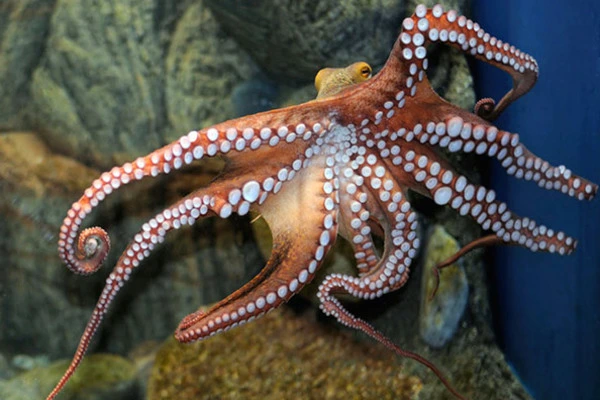Octopuses are amazing creatures that are known for their intelligence and adaptability. While they do not “rewire” their brains, they do show impressive behavioral and physiological adaptations to changing environmental conditions, such as seasonal temperature shifts.
Because octopuses do not thermoregulate, their powerful brains are exposed to – and potentially threatened by – temperature changes. Two-spot octopuses adapt to seasonal temperature shifts by producing different neural proteins under warm versus cool conditions, according to a study published in the journal Cell. The octopuses accomplish this by editing their RNA, which serves as a messenger molecule between DNA and proteins. This rewiring most likely protects their brains, and the researchers suspect that octopuses and squid use this unusual strategy frequently.
“We generally think that our genetic information is fixed, but the environment can influence how you encode proteins, and in cephalopods, this happens on a massive scale,” says senior author Joshua Rosenthal of the Marine Biological Laboratory in Woods Hole, Massachusetts.
In contrast to DNA mutations, which allow organisms to adapt over generations, RNA editing allows individuals to adapt to environmental changes in a temporary and flexible manner. Although RNA editing occurs throughout the tree of life, RNA recoding (when the editing changes the subsequent protein structure) is much rarer, except in soft-bodied cephalopods such as octopuses and squid. Humans have millions of editing sites but editing affects the protein products in only ~3% of their genes, whereas coleoid or “smart” cephalopods recode the majority of their neural proteins.
Temperature-sensitive editing occurred at about one-third of our sites – over 20,000 individual places – so this is not something that happens here or there; this is a global phenomenon.
Eli Eisenberg
“RNA recoding gives organisms the option to express a diverse quiver of proteins when and where they choose,” says Rosenthal. “In cephalopods, most of the recoding is for proteins that are really important for nervous system function, so the natural question is, are they using this to acclimate to changes in their physical environment?”
To answer this question, the researchers investigated whether octopuses undergo RNA editing in response to temperature changes and whether this editing affects the function of their brain proteins. In the wild, octopuses are subjected to temperature changes that can occur quickly, such as when they dive to colder depths or there is upwelling, or slowly, such as when the seasons change.
The researchers concentrated on California two-spot octopuses (Octopus bimaculoides), which are small, yellowish-brown octopuses with two iridescent blue false eyes beneath their real eyes. The genome of these octopuses, which live off the coasts of California and Mexico, has already been sequenced.

The researchers acclimated wild-caught adult octopuses to warm (22oC) or cold (13oC) waters in tanks at the Marine Biological Laboratory to see if RNA editing is related to temperature variation. They compared the RNA transcripts from cold- and warm-acclimated octopuses to the genome after several weeks to look for signs of RNA editing at over 60,000 previously identified editing sites.
“Temperature-sensitive editing occurred at about one third of our sites – over 20,000 individual places – so this is not something that happens here or there; this is a global phenomenon” says co-senior author Eli Eisenberg of Tel-Aviv University, who handled the computational aspects of the study. “But that being said, it does not happen equally: proteins that are edited tend to be neural proteins, and almost all sites that are temperature sensitive are more highly edited in the cold.”
They also discovered that certain types of neural proteins were more likely to be temperature sensitive, such as proteins associated with cell membranes (which are themselves extremely temperature sensitive) and calcium-binding proteins.
The team then investigated how quickly these changes occurred. Working with juvenile octopuses, the researchers gradually heated or cooled tanks (from 14°C to 24°C or vice versa at 0.5°C hourly increments) over the course of about 20 hours, measuring the extent of RNA editing at several time points: before the temperature change, immediately after the temperature change was complete, and up to 4 days later. They were taken aback by how quickly RNA editing occurred.
“We had no real idea how quickly this can occur: whether it takes weeks or hours” says first author Matthew Birk, who led the project as a postdoctoral fellow at the Marine Biological Laboratory and is now an assistant professor at Saint Francis University. “We could see significant changes in less than a day, and within 4 days, they were at the new steady-state levels that you find them in after a month.”
The team then investigated whether this recoding affected protein structure function in collaboration with Kristen Verhey at the University of Michigan and Roger Sutton at Texas Tech. They concentrated on kinesin and synaptotagmin, two proteins important for nervous system function, and compared edited and unedited versions of each protein. They discovered evidence in both cases that the recoding caused structural changes in the proteins that affected their function.
Temperature-sensitive RNA editing was also discovered in wild octopuses in response to seasonal temperature fluctuations. Temperature-sensitive RNA editing patterns in wild octopuses captured in winter versus summer were similar to those observed in the lab. This was true not only for California two-spot octopuses, but also for the closely related Verrill’s two-spot octopus (Octopus bimaculatus), and the researchers believe that temperature-sensitive RNA editing is common in other octopuses and squid.
















